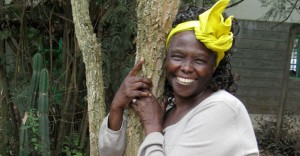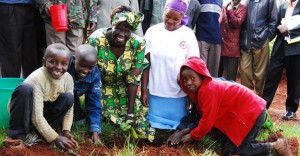Time to Shed Our Fear: Words of Wisdom From an Inspiring Woman
Jun 5th, 2014 | By admin | Category: Environment/SustainabilityBy Suzanne York, www.howmany.org
World Environment Day – a day “for encouraging worldwide awareness and action for the environment” – is another officially recognized day by the United Nations for doing something (anything) positive for the environment.
Given the fragility of the climate, environment and communities around the world, it is a good time to listen and reflect on where we have been and where we are going.
One of the most inspiring people to help guide us today is the late Wangari Maathai, founder of the Green Belt Movement, an environmental organization that empowers communities, particularly women, to conserve the environment and improve livelihoods.Below is an excerpt from Maathai’s acceptance speech for the 2004 Nobel Peace Prize. Her voice is sorely missed today – let’s let her words of wisdom guide us in creating a clean, healthy, and vibrant world for all.
Wangari Maathai, Nobel Lecture, Oslo, December 10, 2004:
Throughout Africa, women are the primary caretakers, holding significant responsibility for tilling the land and feeding their families. As a result, they are often the first to become aware of environmental damage as resources become scarce and incapable of sustaining their families.
The women we worked with recounted that unlike in the past, they were unable to meet their basic needs. This was due to the degradation of their immediate environment as well as the introduction of commercial farming, which replaced the growing of household food crops. But international trade controlled the price of the exports from these small-scale farmers and a reasonable and just income could not be guaranteed. I came to understand that when the environment is destroyed, plundered or mismanaged, we undermine our quality of life and that of future generations.
Tree planting became a natural choice to address some of the initial basic needs identified by women. Also, tree planting is simple, attainable and guarantees quick, successful results within a reasonable amount time. This sustains interest and commitment.
So, together, we have planted over 30 million trees that provide fuel, food, shelter, and income to support their children’s education and household needs. The activity also creates employment and improves soils and watersheds. Through their involvement, women gain some degree of power over their lives, especially their social and economic position and relevance in the family. This work continues.
Initially, the work was difficult because historically our people have been persuaded to believe that because they are poor, they lack not only capital, but also knowledge and skills to address their challenges. Instead they are conditioned to believe that solutions to their problems must come from ‘outside’. Further, women did not realize that meeting their needs depended on their environment being healthy and well managed. They were also unaware that a degraded environment leads to a scramble for scarce resources and may culminate in poverty and even conflict. They were also unaware of the injustices of international economic arrangements.
In order to assist communities to understand these linkages, we developed a citizen education program, during which people identify their problems, the causes and possible solutions. They then make connections between their own personal actions and the problems they witness in the environment and in society. They learn that our world is confronted with a litany of woes: corruption, violence against women and children, disruption and breakdown of families, and disintegration of cultures and communities. They also identify the abuse of drugs and chemical substances, especially among young people. There are also devastating diseases that are defying cures or occurring in epidemic proportions. Of particular concern are HIV/AIDS, malaria and diseases associated with malnutrition.
On the environment front, they are exposed to many human activities that are devastating to the environment and societies. These include widespread destruction of ecosystems, especially through deforestation, climatic instability, and contamination in the soils and waters that all contribute to excruciating poverty.
In the process, the participants discover that they must be part of the solutions. They realize their hidden potential and are empowered to overcome inertia and take action. They come to recognize that they are the primary custodians and beneficiaries of the environment that sustains them.
Entire communities also come to understand that while it is necessary to hold their governments accountable, it is equally important that in their own relationships with each other, they exemplify the leadership values they wish to see in their own leaders, namely justice, integrity and trust.
It is 30 years since we started this work. Activities that devastate the environment and societies continue unabated. Today we are faced with a challenge that calls for a shift in our thinking, so that humanity stops threatening its life-support system. We are called to assist the Earth to heal her wounds and in the process heal our own – indeed, to embrace the whole creation in all its diversity, beauty and wonder. This will happen if we see the need to revive our sense of belonging to a larger family of life, with which we have shared our evolutionary process.
In the course of history, there comes a time when humanity is called to shift to a new level of consciousness, to reach a higher moral ground. A time when we have to shed our fear and give hope to each other.
That time is now.


